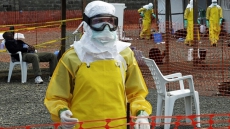VANCOUVER - A British Columbia man has filed a lawsuit alleging he sustained permanent brain damage at the hands of an RCMP officer whose violence was fuelled by steroids.
Robert Wright, 50, was arrested on the evening of April 21, 2012, under suspicion of driving drunk after his wife called police to say she was concerned about her husband being intoxicated.
A "brutal" video obtained from the RCMP through a freedom of information request by Wright's wife, Heather Prisk, shows the handcuffed man kneeling on a concrete bench in a holding cell in Terrace, B.C., on the province's north coast.
Wright is seen agitated and swearing as one of three officers throws him to the floor. On his way down, Wright hits his head on the bench or the floor, leaving a pool of blood under his head.
"What did I say about keeping your feet crossed?" says an officer, who is bending over Wright and dragging him on the floor, leaving a smear of blood.
"Mr Wright, I fully expect your co-operation," the Mountie says. "From this point on, will you stand up?"
Wright is clearly unable to get to his feet and is moaning on the floor.
"He's breathing," says one of the officers.
Wright, who is now unable to care for himself, filed a lawsuit against the RCMP and the province in January but has amended his statement of claim.
The First Nations man, who was a construction worker, alleges Const. Brian Heideman's excessive use of force was exacerbated by the officer's use of steroids that "caused him to be unduly aggressive and violent."
Scott Stanley, Wright's lawyer, said the amendment was made after unrelated allegations surfaced about Heideman's use and distribution of steroids.
Stanley said the video is so graphic that he found it difficult to watch.
"As a lawyer you have to, unfortunately, look at it more than once. When I saw his face dragged across the floor and the blood smear left that's what disturbed me the most," he said.
"He sustained a very significant brain injury that in this instance has caused the near destruction of the quality of his life."
Prisk said her husband was taken to hospital and returned to the cell twice on the night he hit his head and then transported back to hospital the following morning.
But she had no idea he'd been injured or was in and out of hospital when she showed up at the police station on the morning after his arrest, Prisk said.
"They never called me to tell he was transported to hospital."
Wright spent 11 weeks in hospital and a total of 15 weeks at a rehabilitation centre in Vancouver following the injury, Prisk said.
"It's been a nightmare," she said, adding her husband gets care in a nursing home when she needs a break but staff are sometimes unable to manage him there because he tends to wander and is often confused.
"He tried to tell me I have other children and I don't," she said.
Josh Patterson, executive director the BC Civil Liberties Association, said the "brutal takedown" didn't make sense, especially because Wright was handcuffed.
Patterson said that in March 2013, he and Grand Chief Stewart Phillip of the Union of BC Indian Chiefs visited Wright and his wife at their home, and the extent of his brain injury was obvious.
"He couldn't remember Heather from one minute to the next," Patterson said. "It's really, really sad and it's tragic."
None of the allegations have been proven in court. The RCMP hadn't yet filed a statement of defence in the latest allegations.
The incident occurred several months before the Independent Investigations Office, which conducts police-involved use of force or death, was established in British Columbia.
An investigation by the New Westminster Police Department resulted in a recommendation of charges against at least one of the officers but the Crown declined to approve them.
The BC Civil Liberties Association and the Union of BC Indian Chiefs has called on the government to appoint a special prosecutor to review whether criminal charges should be laid but the province did not act on that request.
Wright's statement of claim says he is seeking unspecified damages for pain and suffering, medical expenses, past and future wage loss and other costs.





